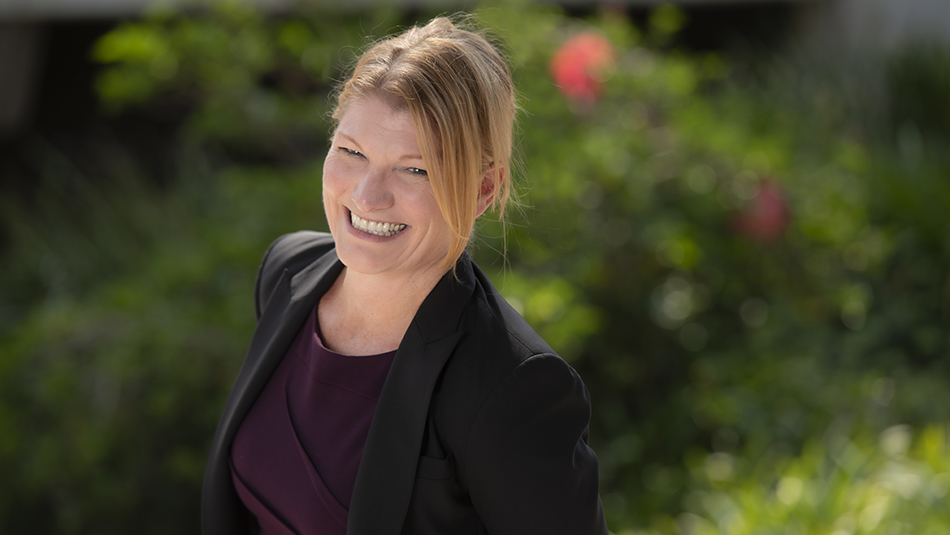
Psychologist lauded for academic merit
Candice L. Odgers, professor of psychological science and the School of Social Ecology’s director of research and faculty development, has been named a Chancellor’s Professor.
The title recognizes scholars who have demonstrated unusual academic merit and whose continued promise for scholarly achievement makes them of exceptional value to the university.
“It is a gift to wake up each morning and go to work at the University of California Irvine, surrounded by brilliant people working to improve society and save lives,” Odgers says. “I was honored by this news and relieved to learn that a criterion for the appointment was ‘continuing to produce notable achievement in scholarship’ as the current moment demands an even stronger commitment to discovery, excellence in science, and the core values that we share here at UCI.”
Nicholas Scruich, chair of psychological science, wrote the nomination letter for Odger’s honor. An excerpt:
“The faculty of the Department of Psychological Science unanimously supports the appointment of Dr. Candice Odgers as Chancellor’s Professor. Dr. Odgers is a globally recognized leader in developmental psychopathology, whose groundbreaking research, methodological innovations, and public engagement have profoundly shaped our understanding of childhood adversity, digital technology, and adolescent mental health. Her work stands out not only for its empirical rigor but also for its interdisciplinary scope, integrating biological, psychological, and contextual models in ways that few scholars have achieved. She has consistently advanced the field by challenging prevailing assumptions, introducing innovative methodologies, and translating complex scientific findings into real-world policy and practice.”
Odgers’ influence extends across the globe. In 2019 and 2023, she was named a Highly Cited Researcher by Clarivate, a recognition reserved for the top 1 percent of researchers worldwide based on citation influence. In 2022, she was an invited member to a scientific advisory board of the United Kingdom Medical Research Council and in 2019, she served on the National Scientific Council. Last year, she made the Orange County Business Journal’s OC500 2024, an annual compilation of the 500 most influential people in Orange County, California.
Her research has been cited more than 20,000 times.
In the past three years, she has published 66 papers in top-tier journals, including Proceedings of the National Academies of Science, Nature Human Behavior, and JAMA Pediatrics.
Odgers’ researches how early, daily and online experiences influence children’s health and development. “Her research has transformed two major areas of inquiry: the effects of digital technology on adolescent mental health and how early adversity ‘gets under the skin’ to shape developmental outcomes,” Scurich notes.
In 2020, Odgers was featured in the New York Times for her critical examination of claims about social media’s harms. Her 2024 commentary in Nature made worldwide headlines and has been cited in more than 200 news stories, solidifying her role as a leading voice in this highly charged policy debate.
In addition to her work on digital technologies, Scurich adds, “Dr. Odgers has pioneered methods for investigating gene-to-geography influences on youth outcomes. Her research has provided new insights into the complex relationships between genetics, mental health, obesity, and educational attainment, as well as the effects of childhood deprivation on later life outcomes.”
Along with UC Irvine Vice Provost for Graduate Education Gillian Hayes, Odgers co-directs the Connecting the EdTech Research EcoSystem (CERES). The Jacobs Foundation, a Swiss nonprofit whose mission is to help children reach their potential worldwide, granted $11 million in 2021 so the talented scholars could create CERES.
Odgers also is the co-director of the Canadian Institute for Advanced Research’s Child and Brain Development Program, which examines the effect of the early environment on the lifelong trajectory going from childhood to old age of physical, mental and social health and wellbeing.
Her own research site at UC Irvine is the Adaptation, Development and Positive Transitions Lab (Adaptlab), which works with collaborators all over the world. The Adaptlab team focuses on mapping trajectories of children and adolescents’ development in daily life and across the life course using a broad range of methods ranging from deploying wearable sensors to merging large-scale administrative records.
Odgers’ research has been disseminated widely via such outlets as The Economist, The New York Times, Scientific American and the Washington Post, and she is the author of nearly 120 scientific publications.
She received her bachelor’s and master’s degrees from Simon Fraser University in British Columbia, Canada, before earning a doctorate in psychology from the University of Virginia. After completing a postdoctoral fellowship at the Social, Genetic & Developmental Psychiatry Centre in London, she joined UC Irvine’s faculty in 2007 as an assistant professor.
“Dr. Odgers began her career at UCI before being recruited to a prestigious position at Duke University, where she helped to lead a major research center spanning multiple departments,” Scurich notes. Her Chancellor’s Professor appointment “is a testament to her exceptional scholarly impact and underscores that she far exceeds the high bar for the title. UCI was fortunate to bring her back in 2016, and since rejoining the faculty, her research and public intellectual influence have only continued to rise.”
— Mimi Ko Cruz